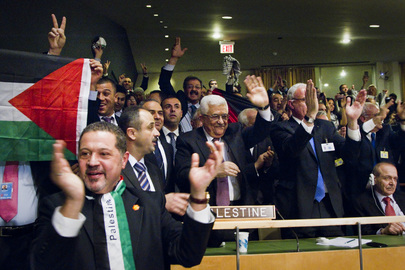Palestine obtains its status as an observer state at the UN. Europeans support

(BRUSSELS2) 138 votes for, 41 abstentions, 9 votes against. The majority expressed at the UN General Assembly in New York on Thursday (November 29) was clear enough for Palestine to obtain its status as an observer state at the United Nations without too much difficulty. After much hesitation, several countries finally joined either the "Yes" camp or abstained. Several of the States reluctant to the status of Palestine finally made the choice not to be totally negative and to abstain. Which amounts to the same in the vote but another effect at the political level. Note that the session was chaired by the Serbian Minister Vuk Jeremic!
Despite their difference in votes, the declarations of the various European Foreign Ministers were unanimous in wishing for a resumption of the peace process and welcoming the solution. On this point Europe has avoided the worst: the difference in votes expresses more a difference of approach than a political contradiction. You can read the various statements of the ministries, linked to the previous article or below by clicking on the country.
The ripple effect
It is undeniable on this point that the French position, fairly quickly printed with a positive vote, led to a seesaw effect for several countries which waited until Thursday (November 29) to announce their intention. Italy, Greece and Sweden voted yes. While Germany or the traditional opponents of the Netherlands swung to abstention.
In the end, 14 countries of the European Union voted yes (Austria, Belgium, Cyprus, Denmark, Spain, Finland, France, Greece, Ireland, Italy, Luxembourg, Malta, Portugal, Sweden), 12 abstained (Germany, Bulgaria, Estonia, Hungary, Latvia, Lithuania, Netherlands, Poland, Romania, United Kingdom, Slovenia, Slovakia), and only 1 voted against (Czech Republic). This was the only country in Europe to find itself alongside Israel and the United States (with Canada, Tonga, Micronesia); which is quite faithful to a constant position of this State (read: “Defensive” a Czech “error” steeped in history…). Compared to the 11 Yes votes, 11 Abstentions and 5 Against at Unesco a year ago, we can clearly see the evolution.
We can also draw a lesson from this vote that the European Union manages to take different positions from the United States and not find itself a minority.
Finally, it should be noted that among the members/associates of the EU, declared or potential, Iceland, Norway, Serbia, Switzerland and Turkey voted yes. While Albania, Bosnia-Herzegovina, Croatia, Montenegro, and Fyrom/Macedonia (the Balkans of sorts) abstained.
The two-state solution
This recognition was quickly greeted Thursday evening (midnight) by Martin Schulz, the President of the European Parliament. " I see this as an important step towards having a more visible, stronger and more effective Palestinian representation. " did he declare. The democratic institution had already marked, in a recent resolution, its support for Palestine's candidacy to become a non-member observer state at the UN. And to reaffirm its support for a two-state solution based on the 1967 borders, with Jerusalem as the capital of the two states, with the State of Israel and an independent, democratic and viable State of Palestine, living side by side in peace and security”.
However warned Schulz: “ Today's vote in the UN General Assembly is in no way a substitute for a negotiated comprehensive political solution acceptable to both parties. We call on both parties to do their utmost to return to the negotiating table and create the conditions for the resumption of direct peace talks. »
Read also: Faced with the recognition of Palestine, the Europeans hesitate. But finally a majority votes yes
